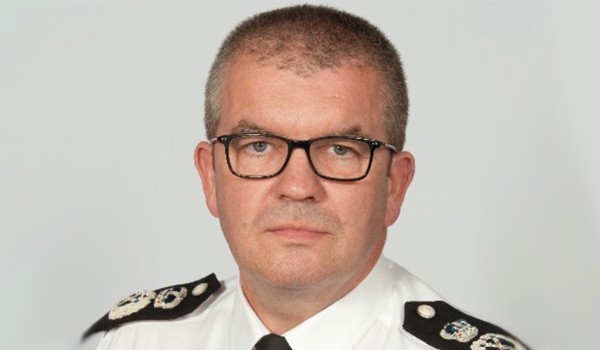By Emily Caulkett-
Potential new recruits will not want to join police in wake of Casey review, warns NPCC chair. The chair of the National Police Chiefs’ Council has warned that people will be put off joining the service after a damning review exposed shocking behaviour and culture within the ranks of the Metropolitan Police Service (MPS).
Martin Hewitt(pictured) said the scathing findings of the Baroness Louise Casey review could cause young women to fear what they could be “subject” to if they decided to become a police officer and cause anyone to question whether they want to do such a job.
The report, commissioned in the wake of Sarah Everard’s murder, found the MPS was “institutionally racist, misogynist and homophobic” and laid bare a slew of troubling incidents.
When Casey’s findings were published on Tuesday, she also warned there may be more officers like killer Wayne Couzens and serial rapist David Carrick.
In response to whether worried that no one is going to want to be a police officer any more after the Baroness Casey review, Mr Hewitt told reporters on Thursday (March 23): “Would it [the report] be putting people off joining? I imagine it absolutely must be.
“I think anybody will think, is that an organisation I want to go and work with?
“If you are from any sort of group that feels, from listening to the report that you know, the treatment will be different…
“A young woman now will be thinking, what am I going to subject myself to if I go and work in that organisation?
“I think we’ve got to accept, but it’s why we’ve got to redouble our efforts on all the things that we’re doing. It’s why we’ve got to be as overt as we can be about what we’re doing and demonstrating what we’re doing.”
Speaking before he leaves his role at the end of March, Mr Hewitt said: “To become a police officer, you are taking a step over a line to become a police officer.
“It has implications for the way you live your life and it has an impact on you and an impact on your family.
“For someone like me, a white, heterosexual man, that was still a step over a line to say do I want to go and do that? Do I want to subject myself to the kind of restrictions that places, but never thinking well am I not going to be treated fairly when I joined the organisation?
“If you’re a 20-year-old black man from Tottenham, for example, that is a massive line to consider stepping over. The impact that is going to have on what your family think about that, what your friends think about that… that is a very, very significant step for someone to take.”
Forces “need people from all parts of society to come and be police officers, but let’s not pretend that’s not going to be difficult because it really is going to be difficult”, Mr Hewitt said, adding: “We’ve tried all sorts of kinds of ways and tried to be innovative – particularly during all the recruitment work that we’ve done under the 20,000 [Government campaign to hire more officers].”
Earlier this week, Baroness Casey suggested other forces in England and Wales should carry out similar reviews but Mr Hewitt said he was “not convinced that is necessary”, adding: “Every police force is looking, and has been looking, at itself post the revelations from both Couzens and from Carrick, and of course, every single police force is using the findings of the Casey review to look hard and close at themselves and understand what the situation is within their organisation.”
“I know that every single chief… will be looking at what that review is saying,” he added.
“The messages from the review are very, very clear. Some of them are very Met-specific in sort of the organisational stuff and the structure and so on.
“But all the points of culture processes are relevant for every force and every force is looking at that.”
Mr Hewitt described how his departure, amid a series of police scandals, was tinged with “sadness”.
“I hate when you hear those stories, it makes me angry and it makes me upset and there’s no doubt, leaving now, there’s a sadness to how I feel about the service,” he said.
“It will improve, we will get better, people will do what we need to do, but it is leaving me with a bit of a sadness as I go, if I’m perfectly honest.”
In his near-30 years of service, he also told how he never felt “shame at being a police officer” until the day he learnt Ms Everard had been killed by a serving officer.
One police officer on The Eye Of Media.Com’s thinktank who insisted on anonymity said:” people should not be deterred about joining the police force because of the findings of Baroness Cassey which revealed longstanding issues in the force. The police force needs strong and genuine personalities who will stand for justice, and are prepared to challenge wrong conduct.
‘The problem will many police officers is lacking the courage to call out wrong conduct, and also the strategy to encourage other officers to support them. If the force is serious is changing wrong conduct, a change will be eventually be achieved.
”First, there needs to be a strong coherent system in the force determined to achieve the necessary change. We must begin by refusing to accept recruits with criminal records, and those already on the force with disturbing criminal records ideally should be removed, unless there is strong evidence that they have been good asset to the force with a lot of honour.
Also important is the need for adequate government funding to ensure attractive wages for the police force, as we have a very challenging job to do”.




